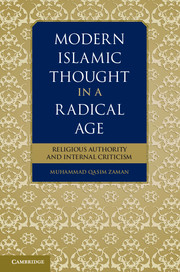Crossref Citations
This Book has been
cited by the following publications. This list is generated based on data provided by Crossref.
INGRAM, BRANNON D.
2014.
The Portable Madrasa: Print, publics, and the authority of the Deobandi `ulama.
Modern Asian Studies,
Vol. 48,
Issue. 4,
p.
845.
Hefner, Robert W.
2014.
Modern Muslims and the Challenge of Plurality.
Society,
Vol. 51,
Issue. 2,
p.
131.
Khan, Mohammed Ayub
2014.
UNIVERSAL ISLAM: THE FAITH AND POLITICAL IDEOLOGIES OF MAULANA BARAKATULLAH ‘BHOPALI’.
Sikh Formations,
Vol. 10,
Issue. 1,
p.
57.
Bangstad, Sindre
and
Linge, Marius
2015.
‘Daʿwa is Our Identity’—Salafism and IslamNet’s Rationales for Action in a Norwegian Context.
Journal of Muslims in Europe,
Vol. 4,
Issue. 2,
p.
174.
Caron, James
and
Dasgupta, Ananya
2016.
Popular culture, radical egalitarianism, and formations of Muslim selfhood in South Asia.
South Asian History and Culture,
Vol. 7,
Issue. 2,
p.
107.
Spannaus, Nathan
2016.
The Ur-Text of Jadidism: Abū Naṣr Qūrṣāwī’s Irshād and the Historiography of Muslim Modernism in Russia.
Journal of the Economic and Social History of the Orient,
Vol. 59,
Issue. 1-2,
p.
93.
Iqtidar, Humeira
2016.
Redefining ‘tradition’ in political thought.
European Journal of Political Theory,
Vol. 15,
Issue. 4,
p.
424.
Caron, James
2016.
Sufism and liberation across the Indo-Afghan border: 1880–1928.
South Asian History and Culture,
Vol. 7,
Issue. 2,
p.
135.
Wagner, Mark S.
2016.
Ḥukm bi-mā anzala'llāh: The Forgotten Prehistory of an Islamist Slogan.
Journal of Qur'anic Studies,
Vol. 18,
Issue. 1,
p.
117.
Saikia, Yasmin
2016.
Uncolonizable: Freedom in the Muslim mind in colonial British India.
South Asian History and Culture,
Vol. 7,
Issue. 2,
p.
117.
Koul, Ashish
2017.
Making new Muslim Arains: reform and social mobility in colonial Punjab, 1890s-1910s.
South Asian History and Culture,
Vol. 8,
Issue. 1,
p.
1.
Tareen, SherAli
2017.
Revolutionary hermeneutics: translating the Qur’an as a manifesto for revolution.
Journal of Religious and Political Practice,
Vol. 3,
Issue. 1-2,
p.
1.
Saikia, Yasmin
2017.
HijratandAzadiin Indian Muslim Imagination and Practice.
Comparative Studies of South Asia, Africa and the Middle East,
Vol. 37,
Issue. 2,
p.
201.
Khalil, Mohammad Hassan
2017.
Jihad, Radicalism, and the New Atheism.
Sajjad, Fatima
Christie, Daniel J.
and
Taylor, Laura K.
2017.
De-radicalizing Pakistani society: the receptivity of youth to a liberal religious worldview.
Journal of Peace Education,
Vol. 14,
Issue. 2,
p.
195.
Enayat, Hadi
2017.
Islam and Secularism in Post-Colonial Thought.
p.
39.
Aljunied, Syed Muhd Khairudin
2017.
In Defense of Guided Reason: Hamka and the Reconstruction of Southeast Asian Islam.
History of Religions,
Vol. 57,
Issue. 2,
p.
107.
Enayat, Hadi
2017.
Islam and Secularism in Post-Colonial Thought.
p.
55.
Wilbur, Douglas
2017.
Propaganda’s Place in Strategic Communication: The Case of ISIL’s Dabiq Magazine.
International Journal of Strategic Communication,
Vol. 11,
Issue. 3,
p.
209.
Belal, Youssef
2018.
Islamic Law, Truth, Ethics.
Comparative Studies of South Asia, Africa and the Middle East,
Vol. 38,
Issue. 1,
p.
107.





